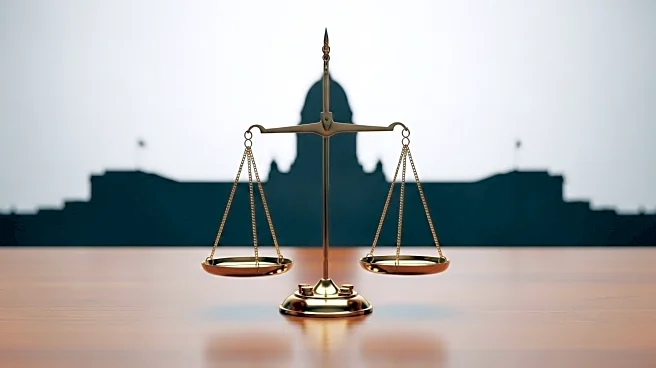What is the story about?
What's Happening?
The U.S. Senate has failed to pass a short-term funding bill aimed at ending the government shutdown, which has now entered its eighth day. The bill, which was passed by the House, sought to extend government funding until November 21 but did not achieve the necessary 60-vote threshold in the Senate, with a vote of 54-45. This marks the sixth unsuccessful attempt to pass a funding extension. The Senate also rejected a Democratic version of the bill that included healthcare provisions. The ongoing shutdown has left Washington in a state of gridlock, with both parties blaming each other for the impasse. House Speaker Mike Johnson has expressed support for federal workers receiving back pay, despite mixed messages from the White House.
Why It's Important?
The prolonged government shutdown has significant implications for federal workers and public services. Many federal employees are either furloughed or working without pay, affecting their financial stability. The shutdown also disrupts various government operations, including national security and public health services. The failure to pass a funding bill reflects deep partisan divisions in Congress, which could lead to further economic uncertainty and impact public trust in government institutions. The situation underscores the challenges in reaching bipartisan agreements on critical issues, such as budget allocations and healthcare provisions.
What's Next?
The Senate is expected to hold another vote on the dueling short-term spending bills, although both are likely to fail again. Lawmakers continue to blame each other for the ongoing shutdown, with Republicans accusing Senate Democrats of being influenced by progressive factions, while Democrats criticize Republicans for avoiding negotiations. The impasse may lead to increased pressure on both parties to find a compromise solution. Additionally, the introduction of a bill by Congressional Democrats to provide childcare relief to federal workers during the shutdown could gain traction as a temporary measure to alleviate some of the burdens faced by affected employees.
Beyond the Headlines
The government shutdown highlights broader issues within the U.S. political system, including the increasing polarization and difficulty in achieving bipartisan cooperation. The situation may lead to long-term consequences for public policy and governance, as well as potential shifts in voter sentiment ahead of upcoming elections. The shutdown also raises ethical questions about the treatment of federal workers and the prioritization of political agendas over public welfare.


















